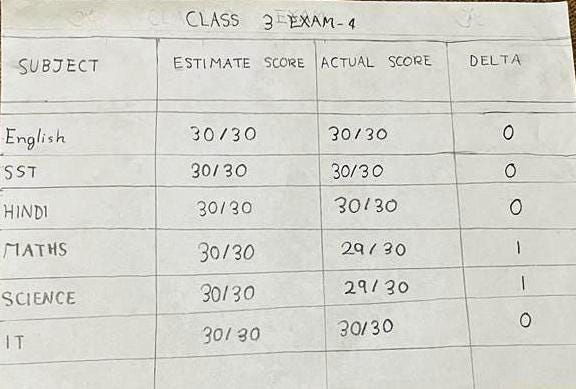Estimating Self-Worth: A Lesson in Self-Evaluation for Kids
Written on
Understanding a Child's Mind
As a parent, I've often wondered what thoughts occupy a child's mind. Are they aware of their actions and whether they are right or wrong? At what age should we start instilling the importance of self-awareness and accurate self-assessment? Children possess immense potential, but they gradually form belief systems shaped by their surroundings. The earlier they grasp the significance of self-evaluation, the better their decision-making skills will develop.
In pursuit of this goal, I decided to conduct a little experiment with my daughter, who was in Grade 3 last year. Before her upcoming exams, I encouraged her to review all the subjects her teacher would test. I asked her if she felt confident and prepared to perform well. Her enthusiastic reply was a resounding "YES!"
To make it more engaging, I proposed a game: "Let's quantify your confidence level and see how accurately you can assess yourself." I asked her to create a table where she could predict her future scores based on her confidence in each subject. She eagerly filled it out, estimating a perfect score of 30/30 in English, 30/30 in Social Studies, and astonishingly, 30/30 in all subjects.
A week later, after completing the tests, we were excitedly anticipating the results to compare with her predictions. What we discovered was a fascinating insight into self-evaluation and accurate self-assessment. She realized she had been slightly overconfident. Here is the final tally of her scores.

Through this exercise, I imparted another valuable lesson: our expectations don't always align with reality. Various factors can prevent us from achieving our goals. However, maintaining confidence and striving for improvement is always beneficial.
Promoting a Balanced Perspective
Students should strive for a balanced view of their abilities—neither being overly confident nor underestimating their efforts. They should focus on their learning processes and put forth their best efforts.
Chapter 1: The Importance of Self-Evaluation
Section 1.1: Understanding Self-Worth
Self-evaluation is a critical skill that can significantly impact children's growth and development.
Subsection 1.1.1: The Experiment

Section 1.2: Lessons Learned
The insights gained from this experience can help guide children toward a healthier understanding of their abilities.